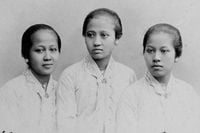On April 21, 2025, Indonesia celebrates Kartini Day, a national observance honoring the legacy of Raden Ajeng Kartini, a pioneer in the fight for women's emancipation in the country. The day is marked by various activities that reflect Kartini's enduring influence on women's rights and education in Indonesia.
Kartini Day is not just a celebration but a reminder of the historical struggles faced by women in Indonesia. According to Adjar.id, in the late 19th century, particularly around the 1880s, societal norms dictated stark differences in treatment between men and women, especially regarding education. Women were often denied access to education, and their roles were largely confined to domestic duties. R.A Kartini emerged as a key figure during this time, advocating for women's rights and education, which were revolutionary ideas for her era.
Born on April 21, 1879, Kartini's contributions were formally recognized when President Soekarno issued Presidential Decree No. 108 in 1964, designating her as a National Independence Hero and establishing Kartini Day as a national holiday. This decree marked a turning point in acknowledging women's rights and the importance of education in empowering women.
The significance of Kartini Day extends beyond mere commemoration; it serves as an inspiration for women to pursue their ambitions and assert their rights. In the modern context, women in Indonesia are encouraged to apply their knowledge and skills across various fields, from education to leadership roles. As noted by Adjar.id, women today can become teachers, leaders, and even military personnel, reflecting a significant shift from the restrictive norms of the past.
Moreover, the concept of women's emancipation has evolved to include personal development and independence. As highlighted in the articles, modern emancipation is about women developing themselves while maintaining their identities. This includes participating in community activities, engaging in leadership roles within organizations, and pursuing academic and non-academic competitions to showcase their capabilities.
To celebrate Kartini Day, many Indonesians share inspirational messages on social media, encouraging women to embrace their strength and potential. The article from Katadata lists 30 inspiring greetings for Kartini Day 2025, which can be shared as captions or statuses. These messages emphasize themes such as empowerment, courage, and the importance of pursuing dreams. For instance, one greeting states, "Happy Kartini Day! Never be afraid to be different," encouraging women to embrace their uniqueness.
Another message reads, "Your voice is power—use it for good," highlighting the importance of women's voices in societal change. Such messages resonate deeply with the spirit of Kartini, who fought for the rights of women to be educated and to have a voice in society.
As the nation reflects on Kartini's legacy, it is crucial to recognize the progress made and the challenges that still lie ahead. The fight for gender equality continues, and Kartini Day serves as a rallying point for women to unite and advocate for their rights. The modern interpretation of Kartini's struggle encourages women to be independent and self-reliant, breaking free from the shackles of discrimination.
In schools and communities, activities are organized to commemorate the day, where students and adults alike engage in discussions about women's rights and empowerment. These events not only honor Kartini's contributions but also inspire the next generation to continue her legacy. As one of the greetings aptly puts it, "To continue the Kartini struggle is the obligation of all women in Indonesia. Happy Kartini's Day!"
As we celebrate Kartini Day, let us remember that the journey toward equality is ongoing. Women are encouraged to pursue their dreams, challenge societal norms, and contribute to their communities. The impact of education on women's empowerment cannot be overstated, as it lays the foundation for a more equitable society.
In conclusion, Kartini Day is a celebration of progress and a call to action for women everywhere. It reminds us of the sacrifices made by pioneers like R.A Kartini and the importance of continuing the fight for equality. As we share our stories and aspirations, let us honor Kartini's legacy by striving for a future where every woman can realize her potential without barriers.


